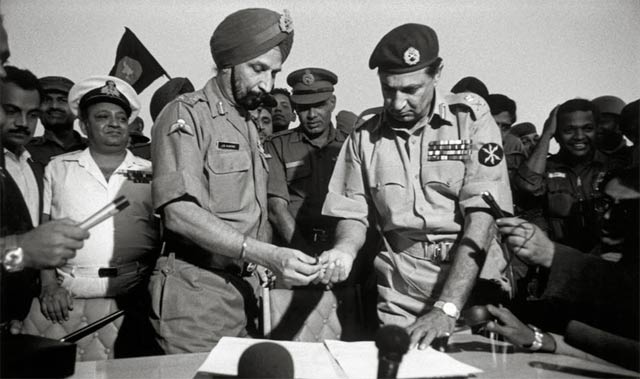
One wondered even then what such assessment was based on considering that both Pakistan and Bangladesh had never found a closure to 1971. Growing up in Pakistan, I am reminded of the history texts I grew up with, which were utterly silent on the debacle except presenting it as a tragedy caused by infiltration of Hindus in the education system. Forget about stories of oppression, there was never any mention of the skewed resource distribution between the two wings. This silence helped erase the memory of the former East Pakistan, especially from the minds of the generation born in the late 1960s and the 1970s.
But the silence was also there because the state did not have a narrative to explain 1971. How was it that the majority of Pakistan’s population, which is what Bengalis represented at that time, walked out on the idea of Pakistan? It was indeed a big blow that jolted the state. From then on, every act and voice of dissent vis-a-vis an authoritarian state by provinces other than Punjab was seen from the lens of the separation of East Pakistan. In some ways, the Baloch and the Sindhis paid the price for the dissent of the Bengalis.
Efforts were made to shift responsibility elsewhere. For instance, an under-construction historical narrative tried to put the onus on Zulfikar Ali Bhutto, despite the fact that he was neither the president nor the commander-in-chief at the time.
A supporting narrative was luckily found after 2004-05, as an Indian writer, Sharmila Bose, started her work on the dismemberment of Pakistan. Her argument was two-fold. First, that allegations of atrocities committed by Pakistan during the events of 1971 were exaggerated claims. Second, that atrocities were also committed by the Mukti Bahini, which meant that the Bengalis were as bad as the Pakistani state. Bose’s book, which finally got published around 2011, was instantly lapped up. It certainly helped in silencing narratives of people like Brigadier (retd) Siddique Salik, the head of ISPR from 1985-88. His book, Witness to Surrender, talked about ethnic bias and its results, something that Bose’s book helped sweep under the carpet. Consequently, another Indian writer, a young Bihari scholar, was helped in collecting material on 1971 to tell stories of Bihari suffering at the hands of Bengalis.
But what Bose’s book managed to achieve was to deflect the issue of state oppression to an argument about exaggerated claims and numbers. The anguish felt by the Pakistani government on the hanging of Jamaat-e-Islami leaders, however, seems to have struck at the narrative-management exercise. So Bose, and later Narendra Modi proved to be of greater help. Forty years after the debacle, Modi’s claim during a visit to Bangladesh that India had created the country must have sounded like milk and honey to those in Pakistan who could never explain the disaster.
Is the anger in Islamabad really a concern for someone perceived as innocent being hanged? Notwithstanding the fact that carrying out death sentences is principally a problematic method to punish wrongdoers, this is a way in which states often try to punish their demons. The Jamaat-e-Islami’s Al-Badr and Al-Shams are Bangladesh’s demons. The hanging happened perhaps, because Dhaka and Islamabad never allowed themselves to achieve a closure to the 1971 debacle.
The Pakistan government recognised the new state of Bangladesh in 1974 after thaw in relations and Sheikh Mujibur Rahman’s visit to Lahore to attend the Organisation of Islamic Cooperation’s conference. However, an assessment of the physical and emotional damage was never made. Pervez Musharraf came the closest in expressing regret for what happened in 1971 when he visited Dhaka in 2002. Perhaps, Islamabad should act bravely and face the demons of history and acknowledge where it went wrong in its dealings with both Bengalis and Biharis. The latter not only suffered due to the war but also because no one ever took ownership of this population.
The government in Dhaka seems to be opening a chapter of history that is its raison d’etre. Instead of pushing Bangladesh away by denying a dark period in our joint history, it will help to be large-hearted. Let’s close this chapter for them and for us in Pakistan. The state of denial indicates a bleeding wound that needs to be nursed. Pakistan will not appear weak, but strong, if it faces some of its history and possibly learn from it. Lack of closure of such wounds enhances the politico-psychological vulnerability of a nation.
Published in The Express Tribune, December 3rd, 2015.
Like Opinion & Editorial on Facebook, follow @ETOpEd on Twitter to receive all updates on all our daily pieces.

1730959638-0/trump-(19)1730959638-0-165x106.webp)











COMMENTS (24)
Comments are moderated and generally will be posted if they are on-topic and not abusive.
For more information, please see our Comments FAQ